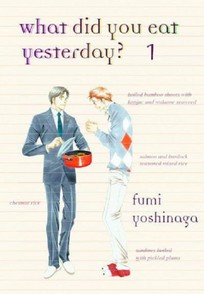Review
by Rebecca Silverman,What Did You Eat Yesterday?
GN 1
| Synopsis: |  |
||
Shiro Kakei is a lawyer who would just as soon keep his private life private. He lives with his boyfriend Kenji Yabuki, a hairstylist, who is as open as Shiro is closed. Together they go through the daily events of life, with Shiro finding release from his tensions in the preparation of meals (on a budget, of course) and Kenji happily consuming them in this sometimes funny, sometimes sweet slice of life from the master of charming BL. |
|||
| Review: | |||
Warning: do not read this book if you are hungry. In fact, you may not want to read it if you don't have access to an Asian grocery, because among other remarkable features, What Did You Eat Yesterday? excels in discussing the preparation and eating Japanese meals. As she has proven in other series, like Antique Bakery and to a lesser extent The Flower of Life (both released in English by DMP/June), Fumi Yoshinaga is a master of making you hungry, and this manga's first volume, while not strictly a foodie's dream, is certainly filled with enough mouth-watering dishes to make you want to get into the kitchen, or at least a restaurant if cooking isn't your thing. This focus on meals and their preparation is also one of the weak points of this book. While each dish is a delight, Shiro's habit of narrating his cooking step-by-step feels like an affectation, particularly for such an accomplished cook. Were he telling someone in the kitchen with him each step, his play-by-play would make more sense, as it does when he and his middle aged friend Kayoko get together to make things. While this isn't enough of an annoyance to warrant not reading the book, it certainly does stand out as one of the few places where Yoshinaga overplays her authorial hand. Far and away the most outstanding feature of What Did You Eat Yesterday?'s first volume is Shiro and his inner conflicts, which may be familiar to others identifying as LBGTQ. While his parents appear at first to be accepting of who Shiro is, we quickly see that they are far from comfortable...or even, on a basic level, understanding. His mother tells him that she's attending meetings for parents of children with gender identity disorder, his father thinks its a fad, and Shiro himself is constantly worrying about how he appears to others. He worries if eating watermelon with a spoon will make him look too gay, among other things, and it's clear that he worries about how people will perceive him. Kenji, on the other hand, is totally comfortable with who he is and how people see him. He's Shiro's opposite, and the two compliment each other nicely, with Kenji accepting things that Shiro could spend days fretting over. While we don't see them interact romantically, they are obviously a devoted couple, and we get a real sense of how comfortable they are together. Their dramas are small and separate, and in their meals together they find respite from them. While this is about a gay couple, it should not, perhaps, be classified as yaoi, or even BL. That is undeniably a factor in the plot, it is not the plot, and there really is very little romance. It is entirely possible that things will change as the series progresses, but as of this volume, those who are not fond of the genre need not shy away from reading this. It is much more easily placed in the slice-of-life category with protagonists who happen to be gay. In some senses this is Yoshinaga's most accessible series – a story about a couple and their friends and associates. Major events are sales at the grocery, making a new friend, a difficult day at work, a trip home. Yoshinaga makes us care about these things and despite what might sound like a paucity of plot, makes the book very engaging. Along with Shiro's issues, Yoshinaga covers a topic that we don't see very often in popular fiction – a husband abused by his wife. This is one of Shiro's cases at work, and while Yoshinaga doesn't spend a lot of time on it, it is remarkable simply for its inclusion. People's reactions to the case are what we might expect, although Shiro himself remains nonplussed. While readers may not be pleased with the outcome of the case, it does provide an interesting subplot. As always, Yoshinaga's art is clean, clear, and delicate. She draws a variety of faces and figures for both genders, and her artwork is easy on the eyes and to read. Vertical's translation is smooth and fluid, with cooking measurements provided for American chefs as well as the original Japanese units. The book itself is beautifully presented, with cover flaps and a comfortably large trim size. If you're already a fan of Fumi Yoshinaga, you're already planning to pick up this book. If you haven't discovered her yet or have shied away from her yaoi or Shakespearean translations, this is an excellent moment to discover why she is so highly regarded. What Did You Eat Today is a story that is by turns sweet, fascinating, and bitter, seasoned with all of the skill of a talented author and worth your time. Just remember not to read it when you're hungry. |
| Grade: | |||
|
Overall : A-
Story : A-
Art : A
+ Thoughtful plot points, interesting characters and social interactions, and lots of food. |
|||
| discuss this in the forum (28 posts) | | |||
| Production Info: | ||
|
Full encyclopedia details about Release information about |
||